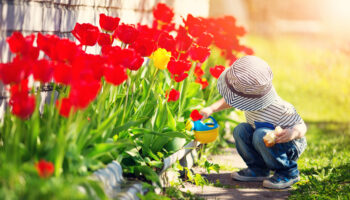Leah Zabari
Tu Bishvat is known as the New Year for trees or as I tell my children, it’s the birthday of the trees! Just as Earth Day is a celebration of the Earth, Tu Bishvat is the celebration of trees. This holiday occurs in mid-winter (January/February) which seems a little strange considering that the trees are bare, and the weather is so cold! But according to Ancient Israel, Tu Bishvat wasn’t a holiday, rather it was a date important to farmers during ancient times. It was a way to mark that the soil was well watered and ready for the planting of new trees.
Being a true lover of nature, I always find special meaning to Tu Bishvat and enjoy teaching and celebrating this holiday with my children. There are so many ways to celebrate the holiday including planting seeds; reading books about plants and trees and studying their lifecycles; having an apple eating party and charting which apple is the children’s favorite. The list of ideas can go on and on and ideas are easily found on the internet. However, as an educator and mother of two, when I reflect on the meaning of Tu Bishvat I connect this holiday with how similar trees are to children.
Each tree is similar in what it needs in order to grow and mature; how each tree has bark, a trunk, and branches; however, there are so many differences that make each tree unique. Think about all the trees on this Earth- fruit trees, trees that give us syrup, coniferous and non-coniferous, trees used for decoration and trees with components to them with the potential to save us in survival situations (i.e., pine trees). When trees are nurtured, they grow. When trees (especially fruit trees) are pruned, they grow back stronger, they produce new growth and go on to give us delicious fruit. When we don’t prune the trees, they eventually stop producing fruit. This is the same with children. When children are nurtured, they too, grow. Children will grow physically, but if they are not nurtured and pruned, it is quite possible they will not be able to produce new growth mentally and spiritually.
I believe we all have a responsibility to be good stewards of the land we live in and advocate for a better world. My belief also extends to our responsibility as educators to be good stewards of the children we care for and advocate for their well-being. Forming and building relationships with the children we care for is the foundation for leading children to new growth and development. Are you building relationships with each individual child and celebrating their own uniqueness in order for them to grow?
The next time you look at a tree, I encourage you to think about the children in your classroom or in your home. Are they growing strong and healthy like the tree you are looking up at? Are you nurturing them not just with food, but with continued pruning in order for new growth to form? Find the potential in each of the children you work with every day and celebrate them just as you would celebrate the Earth and its trees!




